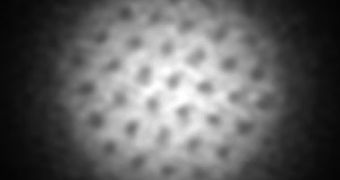This was what a team of Australian and Chinese scientists were trying to find: simple equations describing complex behaviors of atomic systems. This has been the central aim of physics for some time now, and this team says they've got observational evidence of a universal behavior.
Peter Drummond and Xia-Ji Liu, of the Australian Research Council Centre of Excellence for Quantum-Atom Optics, University of Queensland (UQ) and a Chinese team led by Hui Hu of Renmin University of China (RUC) in Beijing made the findings.
"In normal systems, a particle's behavior is determined by its type; atoms react differently to protons for example," he said. "However, recent work by our UQ team has shown that for systems with strongly interacting particles (specifically particles such as fermions which like to remain apart) their behavior does not depend on the type of particle. This behavior is known as Universal Behavior."
They performed experiments on ultra-cold atoms, under conditions of a very high vacuum and a strong magnetic field, and claim to have found a universal regime. Near absolute zero, the matter stops acting the way it should and starts exhibiting some strange properties, dictated by the quantum states.
"All three experiments, on different types of atom and under different conditions, agree precisely with the theory produced at UQ," he said. "This breakthrough lays the foundation for understanding the universal state, exciting researchers who are trying to better understand high Tc superconductors," Professor Drummond said.
Data collected from the three experiments show that all of it lays on a single, universal curve, like the one predicted last year for explaining properties of this universal matter, by the same UQ team, based at UQ's School of Physical Sciences.
Practical applications of the phenomena described by the universal state of matter include high magnetic field MRI machines and very efficient electric motors and transformers.

 14 DAY TRIAL //
14 DAY TRIAL //